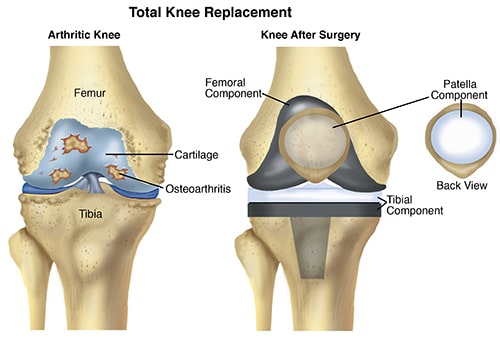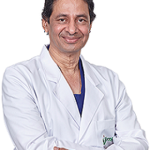Knee Replacement Surgery in India

Total Knee Replacement will cost you USD 4500 in a twin sharing room and USD 5500 in a single room. This is standard tariff using standard US FDA approved implant. If a specialized implant is required then the cost will increase.
Overview of Total Knee Replacement Surgery in India:
Total Knee Replacement, also known as total knee replacement implants or knee arthroplasty is the replacement of your knee joints by surgery. This is done to relieve chronic knee pain and disability and to improve knee movement. Patients who need knee replacement have pain while walking, climbing stairs and getting in and out of the chair. The degree of pain varies from patient to patient depending on age, weight, and level of joint degeneration.
Revision Total Knee Replacement or total knee replacement recovery process is revising or redoing a knee that has already had a total knee replacement surgery. A revision or redo is required if the previous surgery’s prosthesis has failed. In most of the total knee replacement operations, the results are life-enriching enabling people to be more active and mobile without pain. However, in the unfortunate situation of a failure of the total knee replacement, it becomes swollen and causes enormous pain. The patient may feel stiff or unstable making it difficult for him or her to do routine things like walking or climbing stairs.
Who Needs Total Knee Replacement?
A primary reason for the degeneration of the knee joint is osteoarthritis which is a common ailment related to age. Osteoarthritis causes the articular cartilage to wear away, resulting in severe knee pain and stiffness.
Other reasons for wanting a total knee replacement are rheumatoid arthritis, trauma, and deformity of bone or even psoriatic arthritis. There are also various other conditions that necessitate a knee arthroplasty doctor to recommend total knee replacement. These could be cartilage defects, meniscus tear, and ligament tear. Knee
Replacement can be total knee replacement or partial knee replacement depending on the patient’s knee condition.
If your knee replacement is causing pain, stiffness, and instability then your knee arthroplasty surgeon will recommend second surgery which is called Revision Total Knee Replacement Surgery. In this procedure, your doctor removes implants of the previous surgery and replaces them with new ones. Though it may seem similar, revision surgery is more complex compared to the first surgery needing specialized implants and tools along with meticulous planning.
There are different types of Revision Total Knee Replacement. In total there are a total of 3 primary components to Knee Replacement i.e. femoral, tibial and patellar.
At times any one of the knee implants needs to be replaced, whereas in other cases all 3 needs to be replaced with new implants. The bone around the knee has to be rebuilt using augments or bone graft. Damage to the bone necessitates the use of a specialized implant with the longer and thicker stem that will fit deep inside the bone for extra support to ensure the stability of the newly revised implant.
About the Total Knee Replacement Procedure
During Total Knee Replacement Procedure, the front of the knee is exposed. The quadriceps muscles are detached from the patella. Patella is commonly called kneecap. The patella is placed on one side of the tibia. Tibia is the main bone below the knee. Your surgeon will remove the worn-out cartilage, knee tissues, and bone which is damaged along with anterior cruciate ligament.
Thereafter, the bony surface of both tibia and femur (Bone above the knee) end is resurfaced to fit the prosthesis. Your surgeon will cement up to three prosthetic components into place, including a metal femoral shell (pause), a metal and plastic tibial component, and a plastic patellar component.
During the surgery, any deformity that may have been there being corrected. The ligaments are balanced so that the knee recovers its range of movement making it stable and aligned. Before the incision is closed the surgeon will rotate and bend the knee to ensure that the knee has mobility and will function properly.
Total Knee Replacement Revision is a more complex procedure compared to the primary Total Knee Replacement. It also takes longer compared to the primary Total Knee Replacement.
The incision will be made on the lines of the original Total Knee Replacement incision. After the incision, the surgeon will move aside Knee cap/patella to one side thus revealing your knee joints. After that, he will examine all the parts and components of the Total Knee Replacement implant. It’s not necessary to remove all the components of the previous surgery but only the loose or infected parts. He will then remove the knee implants and the cement on the bone surface. After that, he prepares the bone for the new implant. A specialized implant is used for Revision Total Knee Replacement.
At times to give strength to the new implant bone graft may be used to make up for the bone loss in previous surgery and removal of implant thereafter. After the bone is readied, the implant is placed and fixed. For revision, the stem at times is longer to give strength. Metal block and platform block may be added to the main component in case of a bone deficit. Soft tissue repair may also be required.
After the total knee replacement recovery surgery, the surgeon will check the strength and flexibility that the new implant provides.
Expected Outcome After Total Knee Replacement
The Total Knee Replacement usually lasts 2 hours. After that, you are moved into a recovery room and thereafter to your room. The pain will remain for a couple of days but medicines will help to reduce it. A day after surgery, your therapist will bend your knees and if possible you will be asked to take a few walking steps. Within days you will start walking normally. You will also be able to climb the stairs.
Occasionally the pain will be there but that is part of the recovery process. Knee strengthening exercises are crucial as it strengthens the muscle around your knee as well. It will have completely recovered within 2 months and you will be able to do the usual routine. But you should be careful not to hurt or put unnecessary pressure on your knees by involving an activity that puts pressure on your knee like horse riding.

Dr. Ashok Rajgopal
Orthopaedic and Joint Replacement Surgeon Chairman , MBBS, MS, MCh, FRCS, 33 years of experience Gurgaon , India

Dr IPS Oberoi
Orthopaedic and Joint Replacement Surgeon Foot and Ankle Surgery , Hip Surgery , Knee Surgery , Shoulder Surgery , MBBS, MS, MCh, 25 years of experience Gurgaon , India

Dr. Hemant Sharma
Orthopaedic and Joint Replacement Surgeon Consultant , FRCS, DNB, Diploma, MBBS, 24 years of experience Gurgaon , India